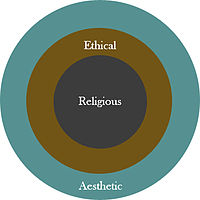
Though Kierkegaard’s social life and demeanor was uninteresting and isolated, and his philosophy didn’t impact many people or other philosophers, like Plato or Aristotle did, Kierkegaard was very concise in challenging people’s thoughts of rationalism and faith. Especially the philosopher Hegel, of whom he was quite critical (Lai, 2002). His philosophy of Existentialism, which is a subjective philosophy that focuses on the real questions facing human being and their responsibilities, was from an individual point of view. It was in the sense of, ‘how does this concern me and the way I live.’ Some of the key questions that his philosophy focused primarily on, include, why do we exist? Does life have meaning? And what is the place of humanity in the universe? (McGuigan, 1989). This is because Kierkegaard believed personal existence could not be confined in a system or merely rationalized. He stressfully wanted to announce the importance of faith and the independence of a human being. How a belief or ‘truth’ shouldn’t be rationalized or justified by the brain or to other people, it should be what your heart and soul believes and has faith in. A ‘new’ way of life was being highlighted by Kierkegaard, with knowledge and rational thoughts being chucked out the window. In other terms, Existentialism was a philosophy of rebellion, focusing on mainly the problems of human’s existence and enforcing that only individuals are the standouts against society and ways of ‘proper thought.’ A major aspect of Kierkegaard’s philosophy and personal belief is, “if you have faith, it is not enough to say you are a Christian, you must express it in every aspect of your life.” (Kierkegaard, 1849) Stating that, if you have faith, you need to express the choices you make, not hide them because they may not be rationalized by others who think different thoughts. According to Kierkegaard, your inner self and your personal faith is what ‘rationalizes’ your choices, not your brain justifying them, because your own will, will allow you to make the decision if you can do something like for instance, ‘taking a leap of faith’ , which is Kierkegaard’s main motto. “There are no moral laws written into the structure of the universe” (Kierkegaard, 1849). Kierkegaard also amplified that there are three different modes of existence, which linked with Existentialism. The first is Aesthetic; an immediate way of living. The second is Ethical; which is you have to stand out from the crowd and be individual. And the third was Religious; which is the highest way of living, involving faith. These are known as Kierkegaard’s three stages of living (Childers, 1991). Searching for the opportunity of enjoyment and living for the moment. The second stage is finding and creating a consistency of moral choices and the third stage is to choose faith over pleasure and duty as well as to jump into the open arms of the Christian God.

